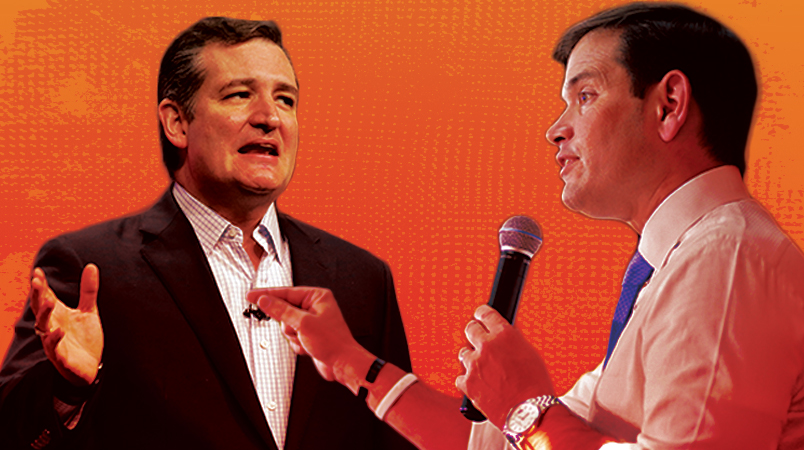While political outsiders Donald Trump and Dr. Ben Carson continue to lead the 2016 GOP field in the polls, attention is beginning to shift to a growing rivalry between two congressional Republicans: Sens. Marco Rubio (R-FL) and Ted Cruz (R-TX).
Rubio and Cruz are both serving their first terms in the U.S. Senate, having been elected with Tea Party support, and each now seeks to differentiate himself from the other. The tensions began when Cruz started taking subtle jabs at Rubio. The Texas senator has described himself as the conservative alternative to the “moderate” Rubio and, unprompted, bashed a sugar subsidy program Rubio supports in the last Republican presidential debate.
Now the two candidates have begun calling each other out by name. Here are three of the areas where the Cruz-Rubio battle lines are being drawn.
Immigration
Cruz and Rubio, both the sons of Cuban immigrants, are now in competition to court primary voters who are hostile towards immigration. Rubio is particularly vulnerable on the issue among hardliners, having been involved in a 2013 immigration reform bill that ultimately stalled. Sure enough, last month, Cruz began bashing Rubio both implicitly and explicitly for working on the bill, which included a pathway to citizenship for undocumented immigrants.
“Talk is cheap. You know where someone is based on their actions,” Cruz told radio host Laura Ingraham when asked about Rubio’s immigration stance. He went on to slam the Gang of 8—the name for the group including Rubio that put together the reform bill—for trying “to jam this amnesty down the American people’s throat.”
Rubio responded by pointing to Cruz’s support for expanded legal immigration and arguing that their positions were not so different. The Cruz campaign vehemently pushed back at the comparison.
Amid the scuffle, Cruz released an immigration platform that cracked down on both legal and illegal immigration while continuing to slam Rubio for “collaboration with President Obama and Chuck Schumer in pushing a massive amnesty bill.”
Rubio, meanwhile, has distanced himself from his previous support of a pathway to citizenship and been vague on his plans for undocumented immigrants.
National Security
Rubio started a scuffle with Cruz on national security last month when he suggested that Cruz “voted to weaken the U.S. intelligence programs” with his support of the USA Freedom Act, which he said “leaves America vulnerable.” The legislation passed in June and scaled back some of the National Security Agency’s bulk data programs. The new restrictions go into effect this week.
Rubio also has admitted that there was a political advantage in talking about national security after the Paris terrorist attacks. A new TV ad produced by a reportedly pro-Rubio Super PAC repeated the Florida Republican’s line of attack against Cruz in the context of those attacks:
Cruz responded by embracing libertarian criticisms of the surveillance state. The Texas Republican said this weekend that Rubio was “not willing to protect the Fourth Amendment privacy rights of law-abiding citizens.”
His campaign also pointed out that the USA Freedom Act had broad support among Republicans, including some whose endorsements Rubio has welcomed. A pro-Cruz super PAC pushed back at “Marco Rubio’s RINO donors” in a video of its own:
Taxes
The mudslinging between Cruz and Rubio over taxes hasn’t really started yet. But like their skirmishes over immigration and national security, the senators’ opposing approaches to taxes highlights a deeper conflict within the Republican Party.
Cruz’s platform puts him squarely in line with traditional supply side economics. He supports flat tax at 10 percent, among the lowest rate among the GOP candidates who have released tax plans thus far.
Rubio’s plan, meanwhile, reflects a movement within the Republican Party known as the reformocons, who believe in emphasizing economic relief for the middle and lower class rather than just across-the-board cuts. Rubio’s plan includes a new $2,500 per child tax credit, for which he is already receiving flack from the right.
Sen. Rand Paul (R-KY), at a GOP 2016 debate last month, called the credit “a welfare transfer payment.”
Given the already testy rhetoric between Cruz and Rubio, it’s hard to think the Texas senator won’t pounce soon—and he’ll have an opportunity to do it face-to-face in the next GOP debate on Dec. 15.







Castro v. Batista 2.0
The unelectable in pursuit of the unspeakable.
Who?
Imagine! In 2 short months, we get to start seeing which turds begin floating towards the top of the septic tank.
Tonight’s Under-Card! Rank Amateur Cage Match!